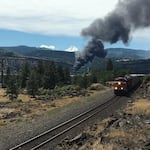The Federal Railroad Administration is requiring Union Pacific railroad to increase its inspections and the quality of its track maintenance.
The agreement announced Friday comes in response to a fiery oil train derailment in June in the Columbia River Gorge.

Train derailment fire as seen from Coyote Wall area on Washington state Route 14.
Courtesy of Derek Greenwood
Under the agreement, Union Pacific will need to increase track inspections to twice per week.
The railroad will also need inspectors to walk key sections of track four times per year – something the FRA did not require prior to the June 3rd derailment.
They’ll also be required to retrain track inspectors and inventory sections of rail across its network, similar to the kind that failed in June.
“I appreciate the FRA’s attention to that specific issue," said Jim Appleton, the fire chief in Mosier, Oregon, the site of the June oil train derailment. "My common sense tells me that yes this will make communities safer. But I don’t think it eliminates the risk of that very hazardous cargo coming off the rail again somewhere.”
The FRA blamed Union Pacific for the derailment, saying it was caused by broken screws that were meant to hold the rail track in place.
Sixteen cars carrying crude oil derailed and caused a fire that burned for 14 hours. The derailment and fire also closed Interstate 84, forced the evacuation of about 100 people in the town of Mosier and left a small oil sheen on the Columbia River.
Under the agreement, Union Pacific – not the federal government – will be responsible for completing the inspections. Current enforcement for track safety is minimal across the country. The Federal Railroad Administration has few inspectors for an expansive network of rail lines. The agency issues violations on only a fraction of the defects it finds. Safety experts say the railroad's fines are too low to be effective.
In a statement, FRA administrator Sarah Feinberg said the new agreement requires Union Pacific to go beyond existing regulations.
“FRA’s highest priority is to keep people and communities safe," she said.
Union Pacific said it supports the agreement, which was reached through a "collaborative effort".
Elected leaders in Oregon and Washington said they were encouraged by the FRA's new requirements for Union Pacific. Governors in both states said the rules were encouraging. The new FRA requirements echo Washington Gov. Jay Inslee's call for mandatory walking inspections in the weeks following the derailment.
Oregon Democratic Senators Ron Wyden and Jeff Merkley, who have introduced two bills on oil train safety, issued a statement saying banning oil trains in the Columbia River Gorge is the only way to prevent future derailments, but that the agreement could be a significant safety improvement.
Rail Incidents and Accidents Since 2006
Compare accident types and causes among the largest freight railroads.